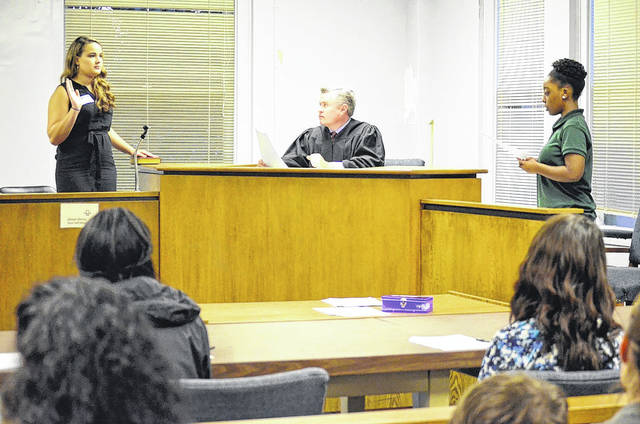ROCKINGHAM — At the Richmond County Juvenile Crime Prevention Council’s Legislative Breakfast on Monday, attendees were presented with recommendations that will be used to dictate policy and shape the county’s youth development options once the “Raise the Age” law goes into effect on Dec. 1, 2019.
The Juvenile Justice Reinvestment Act of 2017, raises the age which teens are tried as adults from 16 to 18, instead referring those 17 and under who are charged with misdemeanors and non-violent crimes — such as larcenies and break-ins — to youth development programs that give them vocational training, teach them life skills and treat them for mental health issues.
Scott Stoker, Piedmont area JCPC consultant and one of the presenters at the breakfast, said the recommendations will go to the Juvenile Jurisdiction Advisory Committee who will then present them to the General Assembly for approval.
The following is a closer look at the recommendations for the next fiscal year:
• Develop two new residential programs using $200,000 in non-recurring funds;
• Expand transitional living and other step-down residential service models for youths 16 and older and juveniles re-entering communities from youth development centers;
• Address vocational skill building while residing in short-term residential facilities;
• Incrementally increase capacity of community-based services in both rural and urban areas;
• Expand the capacity of the county’s programs so they can serve the new definition of juveniles using $3.4 million of state money in fiscal year 2018-19;
• Hire five full-time employees in the first six months of fiscal year 2018-19, to expand to 11 full-time employees by fiscal year 2020-21;
• Allocate $200,000 of state funds toward residential services;
• Allocate $125,000 to community-based services; and
• Hire one full-time contract administrator in the first six months.
North Carolina is the last state in the country to automatically charge 16-year-olds as adults. There have been an average of four 16- or 17-year-olds in the Richmond County Jail since July, according to jail records, and three have been in the jail for the duration of that time period. There were five 16- or 17-year-olds in jail in January and six in February.
Crime rates have decreased across the state — as they have nationally — according to William Lassiter, deputy secretary of juvenile justice with the North Carolina Department of Public Safety. Admissions to juvenile detention centers in North Carolina have dropped from their 20-year high of 9,246 in 2001 to 2,749 in 2016, according to the Department of Public Safety.
There were 82 total complaints against juveniles aged 12 and up in fiscal year 2016-17 in Richmond County, 47 of which were approved for teen court, and 24 admitted to a juvenile detention center, according to the Department of Public Safety.
Hamlet Police Chief Scott Waters, who attended the breakfast along with other law enforcement officials, said he’s a strong supporter of teen court as a way to help Richmond County’s youth get on a better track in life.
“Serious offenses will still be tried as they are (under the Raise the Age bill), but being a youth, I don’t want (16- and 17-year-olds) to have a record that will follow them the rest of their life,” Waters said. “They’re our future and we’ve got to believe in them and we’ve got to put things in place that will help them get ahead.”
Reach Gavin Stone at 910-817-2674 or [email protected].

